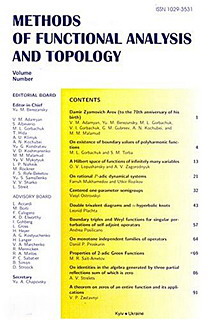Vol. 17 (2011), no. 4
A q-difference operator with discrete and simple spectrum
Miron B. Bekker, Martin J. Bohner, Hristo Voulov
MFAT 17 (2011), no. 4, 281-294
281-294
We continue our study of a $q$-difference version of a second-order differential operator which depends on a real parameter. This version was introduced in our previous article. For values of the parameter for which the difference operator is self adjoint, we show that the spectrum of the operator is discrete and simple. When $q$ approaches $1$, the spectrum fills the whole positive or negative semiaxis.
Dunford-Pettis property of the product of some operators
Belmesnaoui Aqzzouz, Othman Aboutafail, Aziz Elbour
MFAT 17 (2011), no. 4, 295-299
295-299
We establish a sufficient condition under which the product of an order bounded almost Dunford-Pettis operator and an order weakly compact operator is Dunford-Pettis. And we derive some consequences.
Functional evolutions for homogeneous stationary death-immigration spatial dynamics
MFAT 17 (2011), no. 4, 300-318
300-318
We discover death-immigration non-equilibrium stochastic dynamics in the continuum also known as the Surgailis process. Explicit expression for the correlation functions is presented. Dynamics of states and their generating functionals are studied. Ergodic properties for the evolutions are considered.
On infinitesimal structure of a hypergroup that originates from a Lie group
A. A. Kalyuzhnyi, G. B. Podkolzin, Yu. A. Chapovsky
MFAT 17 (2011), no. 4, 319-329
319-329
We describe an infinitesimal algebra to a hypergroup constructed from a Lie group and a conditional expectation. We also prove a theorem on a decomposition of the conditional expectation into the product of a counital conditional expectation and the one that arises in the double coset construction.
General forms of the Menshov-Rademacher, Orlicz, and Tandori theorems on orthogonal series
Vladimir A. Mikhailets, Aleksandr A. Murach
MFAT 17 (2011), no. 4, 330-340
330-340
We prove that the classical Menshov--Rademacher, Orlicz, and Tandori theorems remain true for orthogonal series given in the direct integrals of measurable collections of Hilbert spaces. In particular, these theorems are true for the spaces $L_{2}(X,d\mu;H)$ of vector-valued functions, where $(X,\mu)$ is an arbitrary measure space, and $H$ is a real or complex Hilbert space of an arbitrary dimension.
Elimination of Jacobi equation in extremal variational problems
MFAT 17 (2011), no. 4, 341-349
341-349
It is shown that the extremal problem for the one--dimensional Euler--Lagrange variational functional in ${C^1[a;b]}$ under a strengthened Legendre condition can be solved without using the Jacobi equation. In this case, exactly one of the two possible cases requires a restriction to the length of $[a;b]$, defined only by the form of the integrand. The result is extended to the case of compact extremum in ${H^1[a;b]}$.
Strong base for fuzzy topology
MFAT 17 (2011), no. 4, 350-355
350-355
It is known that a base for a traditional topology, or for a $L$-topology, $\tau$, is a subset ${\mathcal B}$ of $\tau$ with the property that every element $G\in \tau$ can be written as a union of elements of ${\mathcal B}$. In the classical case it is equivalent to say that $G\in \tau$ if and only if for any $x\in G$ we have $B\in {\mathcal B}$ satisfying $x\in B \subseteq G$. This latter property is taken as the foundation for a notion of strong base for a $L$-topology. Characteristic properties of a strong base are given and among other results it is shown that a strong base is a base, but not conversely.
One generalization of the classical moment problem
MFAT 17 (2011), no. 4, 356-380
356-380
Let $\ast_P$ be a product on $l_{fin}$ (a space of all finite sequences) associated with a fixed family $(P_n)_{n=0}^{\infty}$ of real polynomials on $\mathbb{R}$. In this article, using methods from the theory of generalized eigenvector expansion, we investigate moment-type properties of $\ast_P$-positive functionals on $l_{fin}.$ If $(P_n)_{n=0}^{\infty}$ is a family of the Newton polynomials $P_n(x)=\prod_{i=0}^{n-1}(x-i)$ then the corresponding product $\star=\ast_P$ is an analog of the so-called Kondratiev--Kuna convolution on a "Fock space". We get an explicit expression for the product $\star$ and establish a connection between $\star$-positive functionals on $l_{fin}$ and a one-dimensional analog of the Bogoliubov generating functionals (the classical Bogoliubov functionals are defined correlation functions for statistical mechanics systems).


